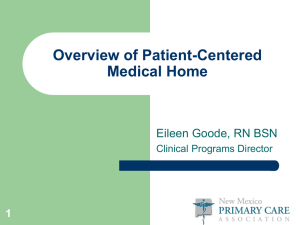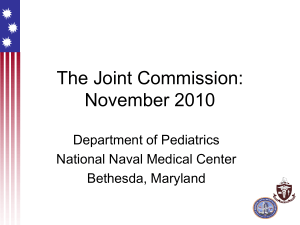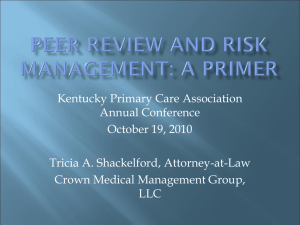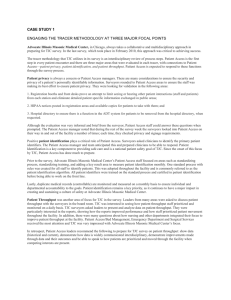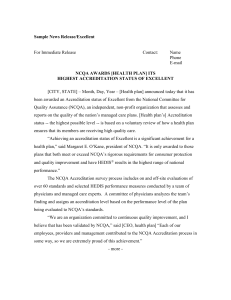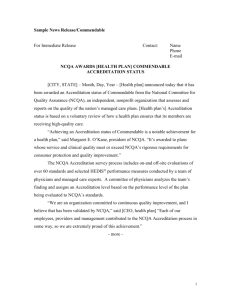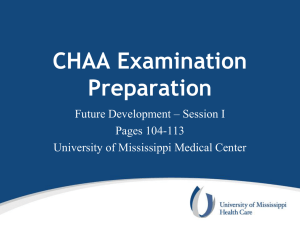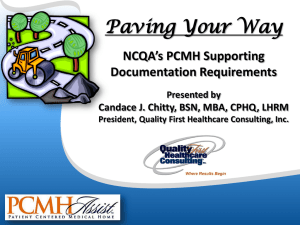Compare TJC, CMS, NCQA
advertisement
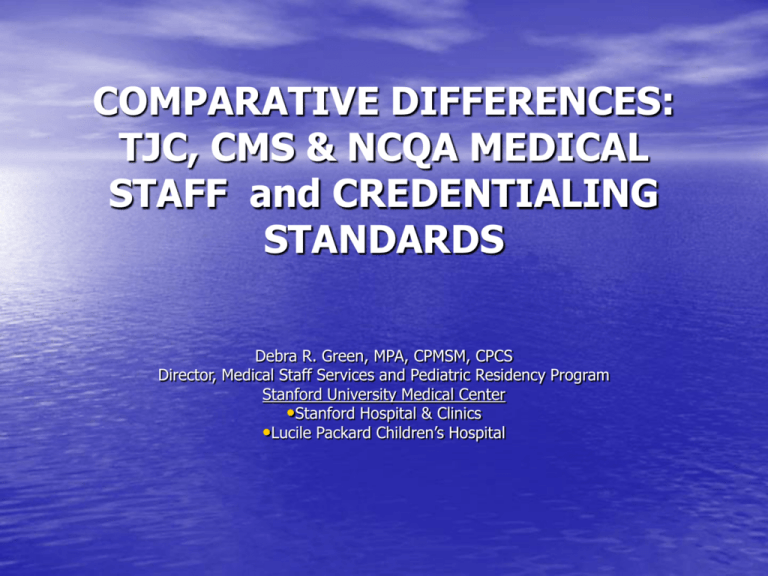
COMPARATIVE DIFFERENCES: TJC, CMS & NCQA MEDICAL STAFF and CREDENTIALING STANDARDS Debra R. Green, MPA, CPMSM, CPCS Director, Medical Staff Services and Pediatric Residency Program Stanford University Medical Center •Stanford Hospital & Clinics •Lucile Packard Children’s Hospital Objectives • Overview of the 3 main regulatory bodies – Who they are? – What they do? – Why they exist? • Overview of Credentialing Standards – Requirements – Compliance • Survey Process The Joint Commission (TJC) • Who are they? – Private Organization • What do they do? - Unannounced Surveys – Can Survey “For Cause” • Why do they exist? – To ensure patient care and quality Center for Medicare/Medicaid (CMS) • Who are they? – Government Organization – Surveyors are typically State DOH employees – Gives deeming authority to TJC, HFAP and DNV • What do they do? – Validate TJC – Can Survey For Cause • Why do they exist? – To ensure patient care and quality Authorities Deemed by CMS • Healthcare Facilities Accreditation Program (HFAP) – Over 200 hospital and 200 other HC facilities and labs – Existed for 60 yrs • Det Norske Veritas Healthcare, Inc (DNV) – Certifies other companies in additional to healthcare – Existed since 1884 (began in Norway) – World wide reputation for quality and integrity National Committee for Quality Assurance (NCQA) • Who are they? – Private Organization • What do they do? – Accredits: MCO’s, MBHO’s, PPO’s, NHP’s etc. – Certifies: CVO’s • Delegated Credentialing Agreements – Hospital does the work for MCO Overview of Standards • Joint Commission – – – 13 total MS Standards Several Elements of Performance (EP’s) Several changes to MS Standard – 2007, eff 1/2008 – – 5 MS Standards Evidence of Compliance – – 12 Standards (Credentialing) Elements of Performance for each Standard • CMS Conditions of Participation (CoP’s) • NCQA MEDICAL EDUCATION • TJC Requirement • (I) Primary Source verification from Medical School • NCQA Requirement • (I) Primary source • • Alternate sources: AMA, AOA, ECFMG • verification from Medical School Not required if board certified or if residency has been verified Alternate sources: AMA, AOA, ECFMG (after 1986), state licensing agency POST GRADUATE TRAINING • TJC Requirement • (I) Primary source verification from training program • Alternate sources: AMA, AOA • NCQA Requirement • (I) Primary source verification from training program • Alternate sources: AMA, AOA, state licensing agency • Not required if board certified (n/a for dentists) PEER REFERENCES • TJC Requirements • (I&R) Required • NCQA Requirements • Peer must be within • (I&R) Peer Review same professional discipline (advisable to utilize peer in same specialty) • Recommendations should address training or experience, clinical competence and ability to perform privileges • 6 General Competencies through Credentials Committee with representation from similar types and degrees of expertise WORK HISTORY • TJC Requirement • NCQA Requirement • (I) Doctor must provide • (I) Doctor must provide • • No verification required chronological history of his education, training and experience Determination of “significant” clinical performance five year work history on application or CV but must explain gaps of 6 months or more HOSPITAL PRIVILEGES • TJC Requirement • “Ability to perform” • Significant clinical • • performance Practice within scope Grant or Deny must be objective and evidence based • NCQA Requirement • Application must include • attestation statement from applicant regarding history of limitation or loss of clinical privileges or other disciplinary action NOTE: NCQA does not require doctors to have clinical privileges at an acute care facility Performance Monitoring • Required only by TJC • Focused Professional Practice Evaluation (FPPE) – Proctoring – Chart Review or Observations • Ongoing Professional Practice Evaluation (OPPE) – Ongoing data assessment for ALL MEDICARE/MEDICAID SANCTIONS • TJC Requirements • NCQA Requirement • Not addressed in • (I & R) Current or standards previous sanctions must be verified • Verify through NPDB, OIG, CMS, FSMB, state Medicaid agency ONGOING MONITORING OF SANCTIONS • TJC Requirements • NCQA Requirement • Not addressed in • P&P’s for the ongoing standards • • monitoring of sanctions 1) Medicare/Medicaid 2) License 3) Complaints Documentation is regularly obtained and reviewed Monitoring Adverse Events DEA/CDS • TJC Requirement • NCQA Requirement • (I & R) Doctor must • (I & R) Verify through provide information regarding previously successful or currently pending challenges or relinquishment of registrations copy of certificates, NTIS, AMA CONTINUING MEDICAL EDUCATION • TJC Requirement • NCQA Requirement • (I & R) Participate in • (I & R) Not Required • • • Continuing Education Documented Considered in Privilege process Should be relevant to clinical privileges requested MALPRACTICE INSURANCE • TJC Requirements • NCQA Requirement • Primary source • Primary source verification not required unless required by bylaws. • (I & R) MS must evaluate professional liability actions verification not required • (I & R) Attestation by doctor or copy of policy showing dates and amount of coverage or Face Sheet MALPRACTICE HISTORY • TJC Requirement • NCQA Requirement • (I & R) evaluate • (I&R) Doctor must evidence of “unusual” or “excessive” number of actions resulting in a final judgment. provide malpractice history for past five years. • Verified through carrier or NPDB NATIONAL PRACTITIONER DATA BANK • TJC Requirement • (I&R) Must query at granting of initial, renewal and when a new privilege is requested. • NCQA Requirement • (I&R) Query if you can’t obtained last 5 years of claims from Insurance carriers. • Use as alternate source for sanctions or limitations on licensure HISTORY OF FELONY CONVICTIONS/Drug Use • TJC Requirements • NCQA Requirements • Terminology is not • (I&R) Application used in Medical Staff Standards • Required under HR Standards must attest to his/her history of loss of license and felony conviction and lack of illegal drug use. BOARD CERTIFICATION • TJC Requirement • (I) Verification not required unless bylaws require board certification • (R) Organization Specific • Verify through ABMS, AOA or specialty board • NCQA Requirement • (I) Not required, but • • verify through ABMS, AMA, AOA, state licensing agency if board certified (R) Verify only if certification has expired (including lifetime) Must document “lifetime” in lieu of expiration date LICENSE • TJC Requirement • (I & R)Primary source • verification required at initial appointment, reappointment, revision of privileges and at time of expiration Current and Valid • Verify through state licensing board • NCQA Requirement • (I & R) Primary source verification required • Must be current and valid • In effect at time of credentialing decision • Verify through state licensing board LICENSE SANCTIONS • TJC Requirements • NCQA Requirements • (I & R) The doctor • (I & R) Primary must provide information regarding challenges or relinquishment of license (attestation question) source verification • Verify through state license board, NPDB, or FSMB ATTESTATION STATEMENT • TJC Requirements • NCQA Requirements • Terminology Not Used • Applicant must provide a current, signed attestation statement regarding the correctness and completeness of application TIME FRAME FOR COMPLETION • TJC Requirement • Structured procedure • must be defined in bylaws Complete applications must be acted upon within reasonable time frame as specified in bylaws • NCQA Requirement • Credentials information must be no more than 180 days old at the time of credentialing committee’s decision LENGTH OF APPOINTMENT PERIOD • TJC Requirement • NCQA Requirement • May not exceed two • Effective 7/1/01 years credentialing period may be for 36 months NOW ABOUT CMS….. Medical Staff Organization • Regulation: – Organized medical staff ; operates under bylaws that are approved by governing body; responsible for quality of care. • Compliance: – Bylaws, R&R’s, Cred files, Quality Reports, Meeting minutes MS Composition (a) • Regulation: – MS composed of MD’s, DO’s according to state law; may also include others appointed by Governing Body. • Compliance: – MS Rosters, Cred Files, Minutes or approved Bylaws categories. MS Composition (a)(1) • Regulation: – MS must conduct periodic appraisals • Compliance: – Cred Files, Profiles, Summary Reports of Credentialing activity, Board minutes documenting last 2 appraisals MS Composition (a)(2) • Regulation: – MS must examine credentials of applicants for membership and make recommendation to Board. • Compliance: – Definition of Creds Review Process in the Bylaws; any MS or Dept minutes that document review and recommendations. MS Organization & Accountability • Regulation: – MS must be well organized and accountable to Governing Body for quality of Medical Care provided. • Compliance: – MS Org Chart, Bylaws Description, Board Minutes, definition of MS Composition in Bylaws, Bylaws approval by Board Medical Staff Bylaws • Requirement: – MS must adopt & enforce. – Must be approved by Board; include category descriptions, H&P requirement and criteria for privileges to be granted; describe MS Organization and applicant qualifications; • Compliance: – Bylaws, R&R, Minutes, Medical Records (H&Ps), Quality reports (H&P timelines data) Autopsies • Requirement: – Secure in all cases of unusual deaths and for med/legal educational interests. • Compliance: – R&R, Autopsy Policy, QA or PI reports; Medical Record Review. History & Physicals (H&P) • New Requirement as of 2007: – No more than 30 days before or 24 hrs after admission • Old Requirement: – No more than 7 days before and 48 hrs after Success Tips for Compliance • Continuous Readiness • File Audits • Database Audits (Appendix A) • Increased Staff Knowledge (Appendix B) • Employee Motivators/Incentives Appendix A Educational and Motivational Tool Fun Quiz Temporary Privileges (Answer Sheet) 1. 2. 3. 4. 5, Appendix B Under certain circumstances, temporary clinical privileges may be granted for a limited period of time. TRUE When temporary privileges are granted to meet an important care need, the organized medical staff verifies only current licensure and current competence before the provider can begin seeing patients. TRUE Temporary privileges for new applicants are granted for no more than 90 Bylaws/120 TJC days. All temporary privileges are granted by the chief executive officer or authorized designee. TRUE Under which circumstances does the Joint Commission allow temporary privileges to be granted? a. To fulfill an important patient care, treatment, and service need. b. When a new applicant with a complete application that raises no concerns is awaiting review and approval of the medical staff executive committee and the governing body. Bonus Question: Temporary privileges for new applicants may be granted while awaiting review and approval by the organized medical staff upon verification of……? List 5 items - Current licensure. - Relevant training or experience. - Current competence. - Ability to perform the privileges requested. - Other criteria required by the organized medical staff bylaws. - A query and evaluation of the National Practitioner Data Bank (NPDB) information. - A complete application. - No current or previously successful challenge to licensure or registration. - No subjection to involuntary termination of medical staff membership at another organization. - No subjection to involuntary limitation, reduction, denial, or loss of clinical privileges. All answers can be found in the Joint Commission Medical Staff Standards under MS.06.01.13 Questions???? Contact information: Email: DeGreen@stanfordmed.org Phone: 650-497-8920
